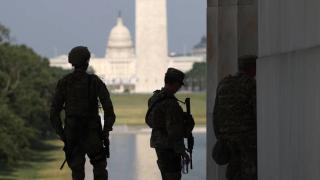Watching the US government's response to the June 1 protests in Washington, DC made my mind wander to 2004, when my soldiers and I were tasked with preventing Iraqi citizens from entering the city of Samarra shortly after US and Iraqi forces conducted a combat operation to clear insurgents from the city. These situations aren't really comparable — the death toll from the Iraq War reaches into the hundreds of thousands — but my soldiers were less aggressive conducting crowd control in Iraq than police in Lafayette Square appeared to be when dealing with peaceful American protestors. Just the fact that events in America even evoked memories from my time in an Iraqi combat zone was jarring.
The images of a military helicopter hovering low to intimidate a crowd of protesters and nearly 40,000 National Guard personnel, wearing the same uniform I did, pouring into the streets of major American cities around the country were surreal to me as a combat veteran. But the image of America's top military officer, the Chairman of the Joint Chiefs of Staff Mark Milley, walking through the streets of the capital in his combat uniform on the way to President Trump's staged photo in front of St John's Church, put the US military squarely in the midst of a political crisis.
The image of America's top military officer, the Chairman of the Joint Chiefs of Staff Mark Milley, walking through the streets of the capital in his combat uniform on the way to President Trump's staged photo in front of St John's Church, put the US military squarely in the midst of a political crisis.
How the United States responds to this civil-military crisis - at the heart of which is the question of whether civilian politicians continue to lean on the military to settle political disputes - will have important consequences for the future of American values and the credibility of American leadership.
There is no doubt the National Guard has and can be used lawfully to help restore domestic order. Throughout US history, presidents have called on both the National Guard and active-duty military for domestic purposes, including for law enforcement - but their ability to do so remains subject to certain legal restrictions.
US presidents have previously invoked a 213-year-old law, the Insurrection Act, to justify their use of active-duty military for domestic law-enforcement tasks. President Trump's ability to do so would be made most politically feasible if a state governor requested federal support, as the governor of Illinois did in response to Chicago's civil rights riots in 1968 and the governor of California did in 1992 in response to the Los Angeles riots. At least so far, however, it seems unlikely any state governor will request such support from Trump to address the current situation.
Even absent a state request, or perhaps in the face of a state challenge, President Trump still has the legal authority to order active-duty troops to help quell protests. President Dwight Eisenhower deployed active-duty troops and federalised the Arkansas National Guard to desegregate Central High School in Little Rock, Arkansas, in 1957, for example, against the wishes of the state's governor.
Presidents have invoked the Insurrection Act at least 19 times before, but it increasingly looks unlikely President Trump will make it 20.
Yet the events of June 1 — combined with the President's brazen tone and General Milley's high-profile involvement — troubled many in Washington and sparked an unprecedented backlash. Former defence secretary Jim Mattis and a number of other retired generals broke with American tradition and publicly voiced their concerns about both President Trump's leadership and the wisdom of using the military on domestic soil.
The high-profile nature of the generals who have criticised President Trump is definitely a complicating factor for a candidate who frequently highlights his love of the military — and who often claims the military loves him back.
In the face of such criticisms and less aggressive protests, President Trump appears to have backed down, and his rhetoric has become less incendiary. But, more remarkably, General Milley issued an astounding apology for following Trump to the photo op, stating: "I should not have been there. My presence in that moment and in that environment created a perception of the military involved in domestic politics." After his apology, Milley will likely be walking a tightrope with the President, and his influence with Trump could wane.
Yet no apology or de-escalation of rhetoric resolves the broader challenges facing the United States in terms of race, police brutality, and the potential use of force for domestic purposes. With no political solution to these problems on the table, the potential for inadvertent escalation — and greater military involvement in American politics — remains.
As the November presidential election approaches, pressures to politicise the military are likely to even increase.
In response to the chorus of generals who have criticised him, Trump will look to marshal military supporters of his own. Competing military support and polarised media will likely cancel out electoral impacts, but the high-profile nature of the generals who have criticised President Trump is definitely a complicating factor for a candidate who frequently highlights his love of the military — and who often claims the military loves him back.
Dissent from military leaders can sometimes support faltering democratic norms. As I saw in Iraq, however, and as I worry others might recognise too late, if American citizens begin to look to the military as the primary arbiter of political legitimacy, it would be a sign that democratic values are in serious trouble - regardless of who wins the election.






